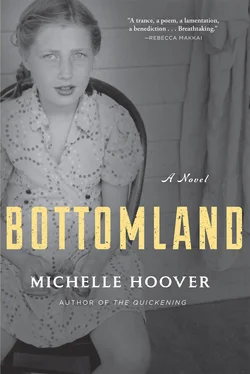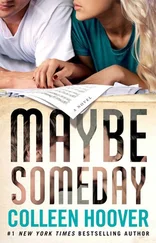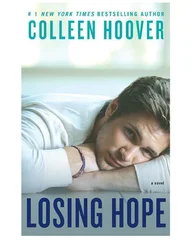“You were gone so long,” she says.
I shake my head to throw off the dust. “I’m fine.”
She takes my arm and I ease myself up. Only when I press my fingers to the wood do I feel the cold of that bench. When we turn to the city, the lake stays dark at our backs. The gulls are gone. The shops are closed now. The walk feels longer than before, though I have Charlotte and her cane, tapping the cement. We are two old women leaning against each other for every step.
“Just a bit farther” she says. “We’ll get you home. You must be coming down with that fever that’s going around.”
“I only lost a little time.”
Charlotte squeezes my arm and doesn’t let go. She studies me out of the corner of her eye. “We’ll get you home.”
I strain to look back. There’s a young girl on my bench. Her name is Myrle. She was always murkier than anyone could have guessed. I watch as she walks into the lake, the water lapping her shins. She’ll go deeper yet. Mother knew it when she filled our heads with the names of things. Because who says a person can’t live more than one life?
“It was me,” I told Charlotte after Greta was born. “I was the one who wanted to go.” And Charlotte pretended that was the way it had always been. “Esther was too jittery here,” she said. “But all you wanted was to get out of your room.” She traced a finger across my palm. “Besides, you talk in your sleep.”
That night before Esther and I left home, when everyone had gone to bed, I took Father’s key while he slept and fit it in the lock. We’ve got to know we’ve stolen the right one , Esther had said. The bolt turned, the door opening. When I stepped out, there was nothing but a thin moon and my feet bare on the wooden planks. I felt my way down the porch steps, through the yard where the grass wet my shins. Come right back , Esther had said, but I wouldn’t. Not yet. The river was quiet against the rocks as I picked my way out.
I had long hoped to try it. Since I’d found Mother so quiet in her bed. Since Tom had left me in the hayloft and Patricia made her announcement: That boy’s gotten himself engaged . All those days spent in my room with my eyes closed, holding my breath — they were only practice for this.
At the river, the dirt turned to mud, the grass higher than my knees. I threw my nightgown on the bank and hugged three stones to my chest. As I waded in, the water was cold enough to burn. The moon barely showed itself. The river cut a trail between the fields. The cold changed to numbness the deeper I went, the current tugging at my feet. The water was soon at my hips. When it reached my throat, I dove in.
There is a place where a person is nothing. Where water is the same as breathing. This was it.
I sat on the muddy floor with the stones pressed to my chest and listened. My ears rang. My heart beating in them. I was more than frozen, the key sharp against the inside of my hand. For a while, it seemed the bottom of the river was what wanted me most. The weeds were knots, the mud pulling at my heels. But this was the agreement I had made with myself. I would pinch my nose. I would dive in. And if something in me wanted to stay with the river, I would.
But soon I felt it, that swelling in my stomach. My arms, that swelling said, they didn’t want stones. I loosened my grip, let them sink. The key I held tight in my fist. I pushed at the mud with my feet, felt myself breaking through the surface. The air was clear and easy in a way I’d never known.
I made my way to the bank, heaving. On a rock, I sat out in the open and let the wind dry me as it could. There were the cicadas again. Farther out, the barn steamed with the animals sleeping. A noise in the meadow — a snake, a rabbit, a bird. I pulled my nightgown over my head, walked until the house showed itself. It seemed low and dull sitting there. I unlocked the door again and drew it fast.
A lantern blazed in the hall. “Why, Myrle,” Nan said, “you’ll catch your death.”
The key I hid behind my back. The river ran down my leg. Nan’s face showed sharp and pale, her arm trembling with the lantern’s weight. Her eyes swept the mat under my feet. When she raised them to my face again, her look softened. She opened her mouth as if she might say something. Instead she smiled.
Oh, Nanny, you can come with us. I took her hand.
Nan’s smile faltered. I wondered if I had spoken aloud. But Nan would never leave. She had let me go weeks before with the draft of that window. For her, she was as much a part of that house as the planks over our head.
“Go on,” Nan said. She jerked her chin at the stairs. I squeezed her hand and ran. At the top, Esther closed the door and sat me on her bed. I was shivering enough for the two of us.
“Where were you?” she asked.
“By the river.”
She frowned. “I don’t think we should go. It’s too far.”
I held out the key to her and she gasped. My hand was bleeding. I’d gripped it so hard, it had made its mark.
“It’s your turn,” I said. “It’s our only chance.”
Esther stared at my hand.
I closed it and opened it again, bloodier now. “Take it.”
She grabbed hold of the key. Closing her eyes, she slit her palm. It took her three tries.
“Promise,” I said.
“Promise.” She pressed her hand into mine.
“We’re going,” I said. “And we’re never coming back.”
Norma Byrne opens the door to the house. Norma Byrne climbs the stairs. If there is any part of me inside that old woman, it’s the part that remembers Mrs. Keyes opening the door to our room all those years ago. Mrs. Keyes who was as wide as the rails. There seem a great deal more steps now than there were then.
I count them as I climb, though already we’re halfway. “One, two,” I start. “Eight,” I say when I reach the landing. “Eight,” Charlotte echoes without asking why.
In our room, Charlotte pulls back the sheets and I rest my head.
“Water?” Charlotte asks. She kisses me.
“They reversed the Chicago River, Charlotte. Did you know that?”
“Of course they did.”
She turns off the lamp. Above my head, the ceiling shifts and the lights from the street, all those circles and lines, move as quickly as water in a glass.
The phone rings. Charlotte hurries into the hall.
“Who is it?” I ask.
“No,” she says into the phone. “There’s no one here by that name.” The phone snaps in its cradle. “Norma?” she says, closer to me now.
The phone rings a second time. Charlotte turns her head and listens. “Must be her again.” Then she’s out in the hall and picking up the phone. “Well, yes. But Norma doesn’t know anyone like that.” The snap in the cradle again.
Charlotte grumbles as she returns to the room. Her neck is flushed with that old Irish blood, something I haven’t seen in years.
“Some woman who says her name is Renie,” Charlotte explains. “Do you know a Renie?”
“Renie?”
“She says she’s someone’s daughter.” Charlotte shakes her head to think. “Bernadette’s daughter, that’s what she said.”
“My sister Nan.”
“I thought she said Bernadette.”
“Is she all right?”
Charlotte drops her hand on my forehead. “What did you say?”
The phone rings again. Charlotte hurries into the hall. “Yes, yes, I might have been wrong. But she’s feeling ill. Can I take your number?”
“Nan?” I call out.
“Yes, that’s right,” Charlotte says into the phone. “I have it. I’ll be sure to give it to her when she’s better.”
Nan with a child. But of course that’s what the letters said. I would have liked to see my sister’s face again. I would have liked to know my niece, the one who’d rather do chores than dress for weddings. Maybe if I have energy enough, I could make the trip. The train isn’t so many days now. When I try to imagine the place, it seems like a foreign country — if I ever knew it. But with those faces again, I might.
Читать дальше












